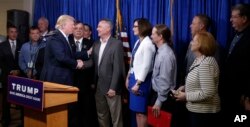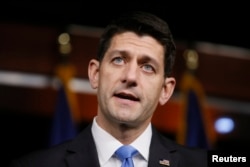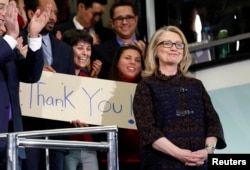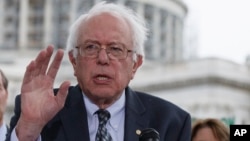Climaxing an unlikely run to the top of the American political scene, billionaire real estate mogul Donald Trump has officially clinched the U.S. Republican presidential nomination, according to a delegate count by The Associated Press.
His last remaining challengers from the onetime 17-candidate Republican field dropped out of the race against Trump in early May, and AP says the brash, former television reality show host is now assured of a majority of delegates — 1,237 — at July's national Republican convention, when he will be formally nominated.
He is likely to win hundreds more convention delegates in the last state presidential nominating contests June 7.
"I'm so honored," Trump told reporters at a news conference in the northern state of North Dakota. He vowed that in the first days of a Trump presidency, he would be overturning executive orders signed by President Barack Obama and rebuilding the country's military.
"Nobody's going to mess with us," Trump said. "We're going to have a lot of fun those first 100 days."
When he entered the presidential contest last June, Trump seemed not much more than an afterthought against the crowded list of current and former Republican senators and governors. Until Trump, neither Republicans nor Democrats — the two main U.S. political parties — had nominated anyone other than a current or former elected official since 1952, when a World War II hero, former Army General Dwight Eisenhower, won the presidency as a Republican.
But the 69-year-old Trump caught the imagination of millions of Republican voters in state-by-state nominating contests with his nativist, populist calls to deport 11 million illegal immigrants living in the United States, to ban Muslims from entering the country until it could be determined whether they were terrorists, and to build a wall along the Mexican border to block more migrants from entering the country.
Party backing
Some prominent Republicans who earlier supported other presidential hopefuls now embrace Trump's candidacy and policies. But others, including 2012 nominee Mitt Romney, have refused, saying he does not represent traditionally conservative Republican views and that his incendiary comments about women, war heroes and the disabled have been objectionable.
House Speaker Paul Ryan, one of the party's most influential figures, has refrained from declaring his support for Trump. On Thursday, after the two men spoke by telephone, Ryan told reporters it was a "productive" discussion.
In the November 8 national election, Trump is likely to face Democrat Hillary Clinton, a former U.S. secretary of state seeking to become the first female president of the United States.
Current surveys of national political opinion show that contest would be virtually a dead heat.
U.S. presidential elections are not decided by popular vote, but rather by the Electoral College, where the country's 50 states have numbers of votes based on their population and the size of their congressional delegations.
Five and a half months from the election, U.S. political analysts say Clinton has the edge over Trump in the Electoral College, but many voters are only now beginning to pay attention to the Clinton-Trump contest.
Resumes
There are a few well-worn paths to the U.S. presidency. She is following one of them. He is not.
Trump has never been vice president, elected to the U.S. Senate or House of Representatives, or served as the governor of one of the 50 U.S. states. Of the 43 people who have been president, 37 of them held at least one of those positions prior to taking office.
For the six presidents who had not previously held any major elective office, being a war hero like George Washington or Eisenhower or a Cabinet secretary like William Taft or Herbert Hoover was enough to mount a successful campaign. Neither Trump nor Clinton was in the military.
Once formally chosen as the Republican nominee in July, Trump will be the party's second consecutive candidate with a business background.
Romney ran in 2012, losing to Obama, but in addition to being a businessman he had also served a term as the governor of Massachusetts.
For Clinton, her credentials include both a major elected office and a Cabinet position. She represented New York in the Senate until becoming Obama's secretary of state during his first term, from 2009 to 2013.
Obama was also a senator before running for president, as is Clinton's remaining Democratic opponent, Vermont Senator Bernie Sanders, who retains what he says he is a "narrow path" to overtaking her for the Democratic nomination.
New ground
But while Clinton's path was once a near certain way to become president, those days are distant American history.
In the country's earliest days, four of the first eight presidents had been secretaries of state. Since then, only James Buchanan has followed that path. He was elected in 1856. And before Obama was elected in 2008, the last president with congressional service but no time as either vice president or governor was John F. Kennedy, who took office in 1961 after serving as a senator.
One historic advantage for Clinton is her career as a lawyer. More than half of all U.S. presidents have been lawyers, including Obama.
However, history is not kind to Clinton in a way that massively favors Trump. He, like all previous U.S. presidents, is a man. She is expected to become the first woman ever to lead a major party's presidential ticket when the Democrats hold their party convention in July.








